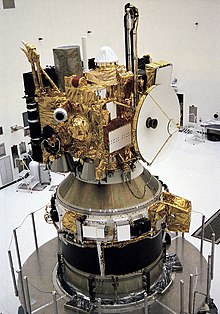Transfer Orbit Stage

The Transfer Orbit Stage ( TOS ; German " Transfer-vom-Orbit -stufe " ) was a solid rocket stage developed by the Orbital Sciences Corporation , now Orbital ATK , founded with this product idea by David Thompson, Scott Webster and Bruce Ferguson in 1982 for NASA was developed.
Calls
The rocket stage was only used twice.
Mars Observer
The Mars Observer was launched on 25 September 1992 aboard a launch vehicle of the type Titan III / Commercial from Launch Complex 40 at Cape Canaveral into space. After reaching earth orbit, the satellite was accelerated by means of the Transfer Orbit Stage towards Mars , which it reached properly. There, however, after sending two images, NASA lost radio contact.
Advanced Communications Technology Satellite
During the mission, STS-51 of the Space Shuttle Discovery was NASA satellite on 12 September 1993 Advanced Communications Technology Satellite (ACTS) of the low earth orbit , where the space shuttle flew through the TOS on a Geosynchronous orbit transported. The mission was successful, the $ 500 million satellite was operated beyond its regular service life from 1993 to 2000 until April 28, 2004 by a consortium led by the University of Ohio, and then moved into a parking position.
swell
- ACTS in the Encyclopedia Astronautica , accessed June 29, 2009.
Individual evidence
- ^ Orbital ATK: Company Overview. Retrieved February 3, 2016 .
- ↑ NASA: MARS OBSERVER PRESS KIT, SEPTEMBER 1992 ( Memento from February 25, 2004 in the Internet Archive ); Retrieved February 3, 2016
- ^ Brian Berger: Lack of Funding Leads to Shutdown of ACTS Satellite on SpaceNews of May 10, 2004 ( Memento of February 17, 2005 in the Internet Archive ); Retrieved February 3, 2016


